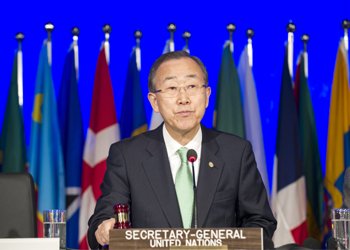Monday 25 June 2012
Rio+20: “Disappointing” or a new direction?

Last week’s highly anticipated Rio+20 summit where 180 world leaders met to create an action plan for sustainable development has been criticised for holding little “concrete action”.
UN Secretary General Ban Ki-Moon (pictured) claimed Rio+20 gave nations a “new direction” at the closing ceremony of the three-day summit in Rio de Janeiro, Brazil.
He said: “The speeches are over. Now the work begins… The outcome document provides a firm foundation for social, economic and environmental well-being. It is now our responsibility to build on it.”
The agreements called for a number of actions: these included beginning the process to establish sustainable development goals; detailing how the green economy can help sustainable development; promoting corporate sustainability reporting; and developing a strategy for sustainable development financing.
However the UK’s Deputy Prime Minister Nick Clegg is said to have dismissed the results as “disappointing” while Environment Secretary Caroline Spelman suggested last week she would have like to see more agreements on the table.
They are not the only ones to express reservations.
Alexander Likhotal, President of NGO Green Cross International, which was founded by ex-Russian President Mikhail Gorbachev following the 1992 Earth Summit in Rio said: “The outcome document is grossly lacking in concrete action.
“Rio+20 represented a unique possibility for the world, but what started as a zero draft outcome document has seemingly evolved into a zero result statement.”
Campaigners have accused the summit of catering to “corporations” more than it should have done.
Nnimmo Bassey, chair of Friends of the Earth International said: “World leaders failed at their Summit in Rio, mainly because of the undue influence that multinational corporations have on them and the UN.”
The UN chief’s words appear to challenge this suggestion. At the closing ceremony he said he was also encouraged by more than 700 concrete commitments registered at the Conference which included some from governments, business, industry and financial institutions.




